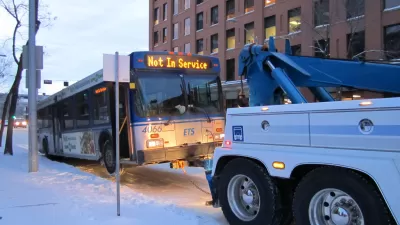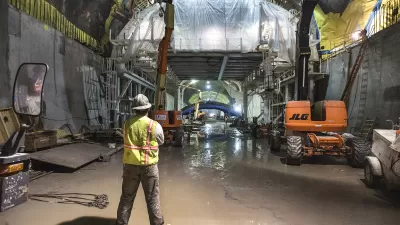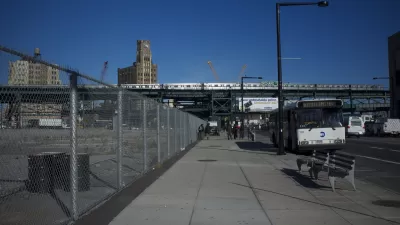In light of the resignation of APTA's president following the withdrawal of the New York Metropolitan Transportation Authority, the Transit Center offers its recommendations for reforming the national transit advocacy organization.

"APTA President and CEO Michael Melaniphy resigned late last month following news that New York’s Metropolitan Transportation Authority [MTA]—which carries 35 percent of the country’s transit riders—was withdrawing from the industry association," writes the TransitCenter.
In the [7-page] letter [PDF] announcing the agency’s decision..., MTA President Tom Prendergast implied that transit agencies in other large cities shared these sentiments. Prendergast described the agency’s “collective dissatisfaction with various aspects of APTA,” including the organization’s governance structure, its excessive membership dues, and Melaniphy’s annual compensation of nearly $900,000. [More reasons posted here].
TransitCenter, a New York City-based transportation research, advocacy and funding organization, views the vacancy as "an opportunity for APTA to move decisively in a new strategic direction."
The case for transit is stronger than ever, between the need to combat climate change through our transportation habits, the decline in driver’s license possession among young people, increased scrutiny of highway-building, and the prominence of socioeconomic inequality as a political issue.
Among TransitCenter's recommendations:
- Widen its leadership to "include advocates with expertise in poverty reduction, urban planning, and housing."
- Become less federally oriented (the group is based in D.C.) and more locally focused, e.g., "ensuring its members are effective advocates against auto-centric development policies."
Among the more controversial recommendations is to deal openly with what Planetizen called "half-baked" rail projects:
It’s hard for a membership-based organization to tell any of its members that they have an ugly baby. But let’s face it: some transit agencies propose (and build) projects that are functionally useless, bad value for money, or just inherently flawed.
State and federal leaders often hesitate to criticize local transit boondoggles for fear of jeopardizing a ribbon-cutting. That’s why APTA is in a uniquely powerful position to educate local officials about transit planning from the ground up, encouraging them to ask what ends they seek to achieve with transit rather than what a particular project should look like.
Finally, TransitCenter recommends that APTA align itself more with "biking and walking advocacy groups" and less with the "highway lobby."
Click here for past posts on TransitCenter.
Hat tip to Martine Powers of POLITICO Morning Transportation.
FULL STORY: The APTA Transit Needs

Study: Maui’s Plan to Convert Vacation Rentals to Long-Term Housing Could Cause Nearly $1 Billion Economic Loss
The plan would reduce visitor accommodation by 25,% resulting in 1,900 jobs lost.

Alabama: Trump Terminates Settlements for Black Communities Harmed By Raw Sewage
Trump deemed the landmark civil rights agreement “illegal DEI and environmental justice policy.”

Why Should We Subsidize Public Transportation?
Many public transit agencies face financial stress due to rising costs, declining fare revenue, and declining subsidies. Transit advocates must provide a strong business case for increasing public transit funding.

Paris Bike Boom Leads to Steep Drop in Air Pollution
The French city’s air quality has improved dramatically in the past 20 years, coinciding with a growth in cycling.

Why Housing Costs More to Build in California Than in Texas
Hard costs like labor and materials combined with ‘soft’ costs such as permitting make building in the San Francisco Bay Area almost three times as costly as in Texas cities.

San Diego County Sees a Rise in Urban Coyotes
San Diego County experiences a rise in urban coyotes, as sightings become prevalent throughout its urban neighbourhoods and surrounding areas.
Urban Design for Planners 1: Software Tools
This six-course series explores essential urban design concepts using open source software and equips planners with the tools they need to participate fully in the urban design process.
Planning for Universal Design
Learn the tools for implementing Universal Design in planning regulations.
Smith Gee Studio
Alamo Area Metropolitan Planning Organization
City of Santa Clarita
Institute for Housing and Urban Development Studies (IHS)
City of Grandview
Harvard GSD Executive Education
Toledo-Lucas County Plan Commissions
Salt Lake City
NYU Wagner Graduate School of Public Service




























